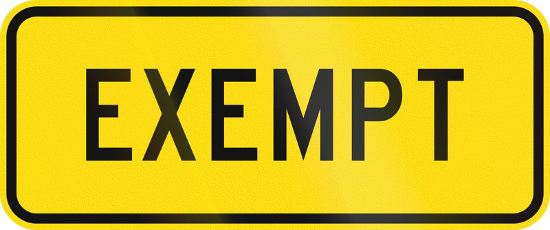
The California Executive Exemption
15 Mar 2018
Have you ever wondered why many employers give fancy titles to rank-and-file employees who don’t have high-level duties that correspond with their titles? The answer is simple, employers use these titles to boost morale and make employees feel important without actually paying them salaries that reflect those extravagant titles.
You see, California’s Labor Code has a narrowly tailored exemption to the law that prevents executive personnel from earning overtime pay and other benefits that the majority of workers are entitled to. Employers frequently misclassify their employees and dupe them into believing that the executive exemption in California applies to them.
Companies then intentionally exploit this false sense of importance to convince their workers that they are in fact exempt from California’s overtime and minimum wage requirements. The problem has become so prevalent that the Plain English Foundation has published a funny list of fancy-pants job titles. But it doesn’t have to be this way, workers can protect themselves and learn about their rights by scrolling down and reading this free article.
A Breakdown of the Test for Exemption:
The Industrial Welfare Commission’s Wage Order No. 1-2001 (or 8 California Code of Regulations §11010(1)(B)(1)) provides the test that determines if a worker truly is an exempt executive. The test has multiple prongs, and a negative answer to any one of the prongs renders the individual employee non-exempt, meaning they are entitled to overtime and minimum wage under California law (unless exempt because of another reason). The test works like this:
- Step 1: Is the employee paid a monthly salary (vs. hourly) of at least twice California’s minimum wage for employment that is full time? if Yes => go to Step 2, If No, the executive exemption does not apply;
- Step 2: Do the employee’s responsibilities and duties include the “management of the enterprise” in which the worker is employed, or of a customarily recognized department or subdivision of that enterprise? if Yes => go to Step 3, If No, the executive exemption does not apply;
- Step 3: Does the employee regularly and customarily direct the work of two or more employees in the enterprise? if Yes => go to Step 4, If No, the exemption does not apply;
- Step 4: Does the employee have the authority to hire/fire other employees or do the employee’s suggestions, and recommendations involving hiring, firing, advancement, promotion, or other change in the status of other employees carry a particular weight? if Yes => go to Step 5, If No, the executive exemption does not apply;
- Step 5: Does the employee customarily and regularly exercise discretion and independent judgment? if Yes => go to Step 6, If No, the executive exemption does not apply;
- Step 6: Does the employee spend more than fifty percent (50%) of his or her time engaged in the exempt work (this is called the primary duties test, see Lab.Code § 515)? if Yes => then the executive exemption does apply, If No, the executive exemption does not apply.
What does it mean to be “exempt?”
Employees that are exempt have been deemed by the California legislature (due to the nature of their work) to be exempt from certain labor laws and rights entitled by other employees. Most importantly, they are not entitled to meal and rest periods, or earning overtime.
Difference between FLSA and state law

California has always put a great emphasis on employee rights, and naturally, its laws provide greater protections than the Federal Labor Standards Act (“FLSA”). Just by way of example, California state law provides a higher minimum wage, a broader definition of overtime which provides greater opportunity for workers to earn it.
Courts in California apply the more generous state rules regardless of whether the individuals are exempt under the FLSA. But this does not mean that a claimant should always sue for overtime under California law, rather than the FLSA. Instead, potential plaintiffs should retain counsel to determine which laws they should proceed under so that remedies are maximized, and procedural standards are most generous.
Employer’s burden to show the employee is exempt
It is the defendant-employer’s burden to plead and prove certain necessary facts to establish that the plaintiff-employee is exempt as an executive employee. (Donovan v. Nekton, Inc. (9th Cir. 1983) 703 F2d 1148, 1151; Renfro v. City of Emporia, Kan. (10th Cir. 1991) 948 F2d 1529, 1540; Ramirez v. Yosemite Water Co., Inc., supra, 20 C4th at 794-795, 85 CR2d at 850). Furthermore, exemptions are narrowly construed so employers must show that a particular employee “plainly and unmistakenly” falls within the terms of the executive exemption.
If paid hourly, an employee is not exempt
Employees must be paid on a “salary basis” for the executive exemption to apply (see step: 1). “Salary basis” means that the employee receives a fixed amount of compensation that is not subject to reduction because of the quality or the quantity of work that is performed by the employee. (29 CFR § 541.602(a)).
Salary cannot be reduced:
Getting paid a salary means that a worker’s pay cannot be reduced because of: (1) changes in the quality or quantity (i.e. hours worked) of work performed, or (2) disciplinary reasons (except when penalties are issued for “infractions of safety rules of major significance.” (29 CFR § 541.602(a), (b)(4)).
Pay cannot be dependent on days or hours worked:
Although there are some exceptions, exempt employees must be paid their full salaries regardless of the hours or days they have worked in that particular week, otherwise they are not paid on a “salary basis” and are non-exempt. (29 CFR § 541.602(a), (b)).
Full day absences for illness or disability okay:
Pay may be deducted for full-day absences for disability or illness without affecting an individual’s status as a “salaried” employee. However, if the employer deducts pay for partial day absences the employee is no longer considered “salaried” and therefore is considered non-exempt and entitled to overtime pay and rest breaks. (29 CFR § 541.602(b)(2); see Sumuel v. ADVO, Inc. (2007) 155 CA4th 1099, 1108, 66 CR3d 622, 628). Deductions for full day personal absences also do not affect “salary status” but deductions for partial days do.


